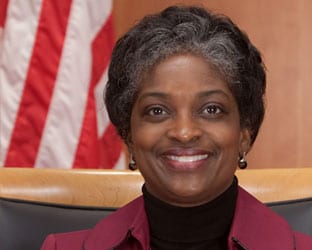 Specifically, FCC Commissioner and former Acting Chair Mignon Clyburn addressed the Future of Music Coalition Policy Summit. Perhaps the most important remarks were the ones she didn’t make.
Specifically, FCC Commissioner and former Acting Chair Mignon Clyburn addressed the Future of Music Coalition Policy Summit. Perhaps the most important remarks were the ones she didn’t make.
Clyburn did mention the traditional method in which musicians got their music out to the public – via record companies and radio stations.
She did not use this as a platform for promoting a radio performance royalty.
Rather, she promoted new avenues for music discovery that musicians can use to bypass both the recording and radio industries – paths made available by the internet.
Clyburn’s primary promise to musicians was to work toward assuring an open internet which will continue to provide them with an opportunity to thrive.
Here are her remarks from the 10/27/14 session.
Two weeks ago, we were honored by the presence of the great Stevie Wonder at the FCC.
Like many baby boomers, I can benchmark some of the highs and lows of my life through references to his songs. “Higher Ground” gave me that much needed lift, when the challenges of the day seemed too tough to tackle. His song “As,” made me feel incredibly positive about the prospect of real love. “Master Blaster” and “Do I Do,” showed me that even a musical genius can experiment and be influenced by current musical trends, and “Sir Duke” and “We Can Work it Out,” let us know how through song, Stevie Wonder respects and pays tribute to the legends of the past.
Growing up in the South also offered me a wealth of musical traditions that shaped my views and tastes. Our family listened to a range of genres, from classical, soul and gospel, to country, rock, blues and jazz. And a little known Mignon Clyburn fact: I took piano and violin lessons for years, and didn’t put the fiddle down until my sophomore year in college, all of which contributed to my eclectic musical tastes.
“Music is the healing force of the world,” according to the lyrics in that upbeat, 1975 O’Jays’ standard “I Love Music”, and like you, I cannot imagine my life without it. And if the classic maxim that love is the universal language of the world is true, I believe that music is a very close second. I also believe, like Berthold Auerbach, that music “washes away from the soul, the dust of everyday life.”
Before coming to Washington five years ago, I served as a member of the Public Service Commission in South Carolina, representing both rural and urban constituents as a state regulator.
Now as a federal regulator, I see myself as a champion of the voiceless — those without well-connected lawyers or lobbyists in Washington, but who still deserve to be heard. I strive to be a “facilitator of opportunities,” and a “connector of the disconnected.” I seek to be a strong advocate for free enterprise and robust competition. I support allowing markets the chance to solve problems, while remaining focused on the consumer. And for me, this means ensuring that consumers have the tools to be able to pick winners and losers – and that we should not give companies priority or allow the government to dictate the result where a functioning market can do it best.
What does this mean for you and your interests? That this Commissioner seeks to advance the optimal expression for artists and the creators of original music, and that our policies should encourage more, and not less, creativity and ownership.
If you have been following the news of late, you have noticed that there is a lot going on at the Federal Communications Commission. And as difficult as it is to keep track of all of the issues we are working on, I can easily sum them up for you in three broad policy goals that have far-reaching implications for the music industry: retaining a free and open Internet, expanding broadband networks’ reach and speed, and promoting competition.
Of course, the most visible of the three is the Open Internet proceeding. Over the past few months, almost four million comments have been filed and are being read. We welcome and are listening to this incredible input. These numbers speak volumes of the tremendous impact the Internet has on our society, and just how important it is to determine the right policy, as the FCC moves to consider permanent Open Internet rules.
For many, this marks their first time participating in a government proceeding, and highlights not only the importance of a free and Open Internet, but the power such openness has to encourage civic engagement.
The power of an Open Internet enables musicians who have been told “no” by big corporations to prove critics and gatekeepers wrong. Musicians can distribute their content online, and demonstrate the power of a good idea to reach millions.
And as we move forward, my focus will primarily be on the impact to consumers—something that I fear has gotten lost in this debate over 706 versus Title II, and the parsing through of each word in the D.C. Circuit’s decision. The critical objective, as I see it, is first determining the right policy, and after that is established, then and only then should we decide on the appropriate legal framework to achieve that result.
The Commission has also been working to implement policies to expand the reach of our country’s wireless and wireline broadband networks, because we realize that broadband is the foundation for economic growth, job creation, global competitiveness, and a better way of life. However, despite its increased importance, we continue to face challenges in getting millions to adopt broadband.
This is disproportionately true among the elderly, those living with disabilities, and in the Latino and African American communities, but we have made progress. And while the adoption gap between whites and African Americans has been nearly cut in half since 2009, we have more work to do. So I commit to you that the FCC will continue to pursue strategies to ensure that all Americans, regardless of how much they make or where they live, are connected.
Last but not least, the Commission is focused on promoting competition. From merger reviews to issues involving wireless spectrum, competition analysis is involved in nearly every issue that the FCC addresses. As I said, it is my personal belief that markets should be left alone when they are working well, but I repeatedly affirm that I am not afraid to step in and regulate when the market does not work to promote fair and equitable results, because absent these objectives, consumers suffer and diversity is put at risk.
At this point, you may be wondering how I plan to further the argument that the broad ideas we are working to implement at the FCC matter to the future of music policy.
With important issues on the table like copyright laws and digital rights management that have direct implications for artists, it is easy to look past the role that communications regulation plays. After all, given that so much of the value of music to content producers depends on legal protection being given to their works after they have been created and distributed, copyright law is critically important to ensuring that artists are compensated fairly. This is especially crucial in the digital age, where technology and online sharing have made piracy a constant threat, from which all artists must guard their work.
However, as a communications regulator, I would argue that cultivating the optimal policy to incentivize and allow creative works to come to the digital marketplace in the first place is equally as important. Without the proper regulatory environment in place, these works may never even get produced, let alone have need for the protection of copyright laws.
So this is where communications policies come in. As an unabashed proponent of diversity, I strive to ensure a level playing field, and for the game to be open to every player who wants to step onto the field.
In the music industry, this means considering the perspectives of both actual musicians and the major industry players to guarantee that artists have access to the internet’s distribution avenues, and that all consumers have access to content. And by content, I mean ALL the diverse content this world has to offer, not just the mainstream, greenlighted or popular music that a few radio stations play over and over again.
Even doing something as simple as listening to a song on your iPhone makes clear that the content producers of today face a different world than those of the past. Instead of the traditional model, where music is distributed via record companies and radio stations, artists now have the option to reach their audience directly through webcasts, websites like Sound Cloud and YouTube, and various other apps. Just think, without YouTube, the world would never have been introduced to Justin Bieber. Without an Open Internet, more success may not be possible.
Today’s musicians increasingly depend on a level online playing field to reach their audiences, one that does not favor different types of content over another. So the FCC’s commitment to retaining a free and open Internet for everyone is critical to me, and to you.
The expansion of broadband networks’ reach and speed will incentivize the innovation of new applications and technology to which even more musicians have access.
Finally, by promoting competition and ensuring that the Internet remains free and open, we can enable mobile platforms to remain accessible to producers and consumers.
By pursuing these three goals at the FCC, I believe we can create a regulatory regime that will enable more creativity and innovation by content producers, while ensuring far-reaching access to diverse music for consumers. I realize that this framework is only one piece of the overall puzzle, but from my perspective, and I know yours, these issues may be challenging, but the future of music remains both dynamic and bright.





